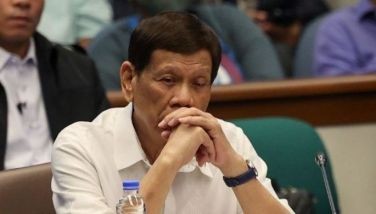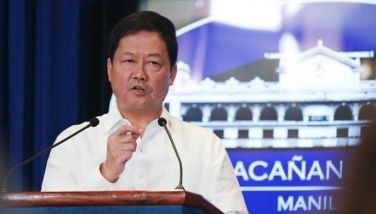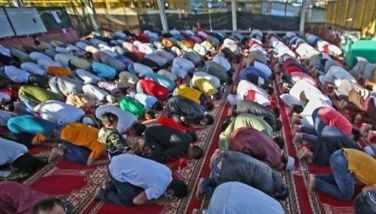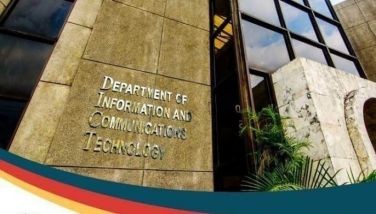US defense secretary offers closer security ties to China
SINGAPORE (UPDATE 2, 10:45 a.m.) — Striking a notably positive tone, U.S. Defense Secretary Ash Carter on Saturday offered closer U.S. cooperation with China in pursuit of a deeper and broader Asian security network. He said he intends to visit Beijing this year.
In a speech to an international security conference in Singapore, Carter repeated frequent U.S. complaints about China unnerving its neighbors with expansive moves to build up reefs, islets and other land features in the disputed South China Sea. But he did not explicitly accuse China of militarizing those areas.
He emphasized possibilities for cooperating with China while stating that the U.S. will remain the pre-eminent power.
"America wants to expand military-to-military agreements with China to focus not only on risk reduction, but also on practical cooperation. Our two militaries can also work together," he said, bilaterally or as part of a broader security network to combat global threats like terrorism and piracy.
"The United States wants to work with China to find solutions for the global problems we're both facing and seize the many opportunities before us," he said.
Carter called for establishing a "principled security network" across Asia, which he defined as "nations building connections for a common cause, planning and training together, and eventually operating in a coordinated way." He said that in September he will co-host, with his Laotian counterpart, a meeting of defense ministers from across the Asia-Pacific, to find new ways to broaden and deepen a regional security network.
In raising the prospect of conflict in the South China Sea, Carter said China is isolating itself by building up man-made islands there. The Chinese in some cases are erecting airfields that will extend Beijing's military reach. He said for the second time in a week that China's actions could erect a "great wall of self-isolation."
"There is growing anxiety in this region, and in this room, about China's activities on the seas, in cyberspace, and in the region's airspace," he said. "Indeed, in the South China Sea, China has taken some expansive and unprecedented actions, that have generated concerns about China's strategic intentions."
He also noted a coming ruling by a U.N. arbitration tribunal on the Philippines' challenge to China's claims in the South China Sea. He called this ruling, which is expected this summer, "an opportunity for China and the rest of the region to recommit to a principled future, to renewed diplomacy, and to lowering tensions, rather than raising them."
During a question-and-answer session with his audience, Carter was asked why the U.S. attaches such importance to exercising its right to fly and sail military aircraft and ships near other countries' coasts, including China's.
"What we stand for is the principle of rule of law and abiding by international law in the commons," Carter said. "It's not a focus on China. It's a focus on principle."
Sen. John McCain, who was attending the Singapore conference as part of a U.S. congressional delegation, said Friday that the arbitration outcome will present sent a chance for China to show its acceptance of international norms.
"This decision should not be viewed by China as a suggestion, but as a law that China must acknowledge, abide by and uphold," he said in his prepared remarks. "The region and the world will be watching to see what choice China makes. In short, China can choose to disrupt the rules-based order. Or it can choose to become a vital partner in maintaining it. I fear the consequences if China chooses the path of disruption."
In his speech, Carter mostly emphasized the positive.
"The United States welcomes the emergence of a peaceful, stable and prosperous China that plays a responsible role in the region's principled security network," he said. "We know China's inclusion makes for a stronger network and a more stable, secure and prosperous region."
He also made clear, however, that the U.S. intends to maintain, even expand, its military presence in the Asia-Pacific.
"The Defense Department maintains its world-leading capabilities because the United States has made incomparable investments in it over decades. As a result, it will take decades or more for anyone to build the kind of military capability the United States possesses," he said.
He mentioned only in passing North Korea's defiant pursuit of nuclear weapons and long-range ballistic missiles.
China did not send its defense minister to Singapore, and Carter held no meetings with members of Beijing's delegation. But at a conference-opening dinner Friday evening Carter shook hands and spoke briefly with the senior Chinese representative, Adm. Sun Jianguo, according to a U.S. official who was present.
- Latest
- Trending































